
July 14
1816 Birth: Arthur de Gobineau, at Ville d'Avray:
His family was of minor nobility with no fortune to speak of, which meant that he was forced to earn his living when he arrived in Paris at the age of nineteen. He wrote serialized novels and articles for journals, but by the time he met Tocqueville, who was ten years older than him, in 1843, he had met with only modest success . . . .
In 1849, when Alexis de Tocqueville was named Minister of Foreign Affairs, he chose de Gobineau to be his head of cabinet, thus opening a diplomatic career that Gobineau never left. He was successively posted to Germany, Teheran in Persia (1855-1858 and 1861-1863), Brazil (1869 and 1870), and finally Stockholm (1872-1877). He died in Turin in 1882.
Today, however, Arthur de Gobineau is famous less for his diplomatic career than as the author of An Essay on the Inequality of the Human Races. In this work, which was published in 1853 and 1855, he attempted to prove that race is the most essential factor in human history, and that a racial hierarchy existed, at the top of which was the Aryan (or Indo-European) race. The decadence of Western civilization could be explained by the impure mixing between inferior and superior races.
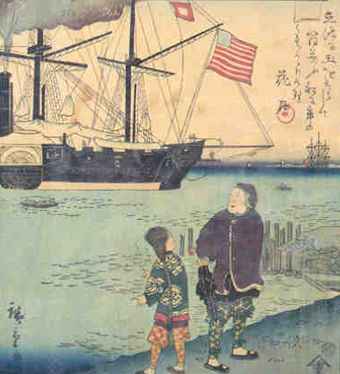
1853 Japan: The intimidated Japanese (See: July 8, 1853) grant US Navy Commodore Matthew Perry the privilege to present Fillmore's letter to the delegates assembled. Perry does so and then departs for the Chinese coast, warning that he will soon return for a reply. (Perry)
President Fillmore's Letter to the Emperor of Japan:
Our great State of California produces about sixty millions of dollars in gold every year, besides silver, quicksilver, precious stones, and many other valuable articles. Japan is also a rich and fertile country, and produces many very valuable articles. Your imperial majesty's subjects are skilled in many of the arts. I am desirous that our two countries should trade with each other, for the benefit both of Japan and the United States.
We know that the ancient laws of your imperial majesty's government do not allow of foreign trade, except with the Chinese and the Dutch; but as the state of the world changes and new governments are formed, it seems to be wise, from time to time, to make new laws. [For the full text, Click here.]
1864 July 14–August 3: In a show of force, US naval forces escort the United States Minister to Japan to negotiations–in the city of Yedo–concerning American grievances.
1882 July 14–18: A US naval force invades Egypt to protect American interests during an armed conflict between Great Britain and Egypt.
1887 Death: Alfred Krupp, German munitions manufacturer:
Alfred Krupp (born Alfried Felix Alwyn Krupp), son of Friedrich Carl, was born in Essen. Friedrich's death in 1826 left his widow as owner of the works. Alfred had to leave school at the age of fourteen and take on the direction of the works. The prospect seemed a cheerless one. His father had spent a considerable fortune in the attempt to cast steel in large blocks: in order to keep the works going at all, the family had to live in extreme frugality, while the youthful director laboured alongside the workmen by day, and carried on his father's experiments at night. For the next fifteen years, the works made barely enough money to cover the workmen's wages.
In 1841, his invention of the spoon-roller brought in enough money for Alfred to enlarge the factory and spend money on casting steel blocks. In 1847 he made his first cannon of cast steel. At the Great Exhibition of 1851 he exhibited a 6 pounder (2.7 kg) cannon made entirely from cast steel, and a solid flawless ingot of steel weighing 2000 pounds (907 kg), more than twice as much as any previously cast.
Krupp's exhibit caused a sensation in the engineering world, and the Essen works at once became famous. In 1851, another successful invention, one for the making of railway tyres, made a profit, which Alfred Krupp devoted partly to enlarging and equipping the factory, and partly to his long-cherished scheme - the construction of a breech-loading cannon of cast steel. Krupp himself strongly believed in the superiority of breech-loaders over muzzle-loaders, on account of the greater accuracy of firing and the saving of time, but this view did not win general acceptance in Germany until after the Franco-Prussian war. Krupp supplied his perfected field-pieces throughout Europe and wished to fulfill an order of guns to Austria-Hungary on the eve of the Austro-Prussian War, much to Bismarck's fury. His greatest grievance against the French was that the French high command had refused to purchase his guns despite Napoleon's support. Following the French defeat he did sell them his guns. Once the quality of this product gained recognition, the factory developed very rapidly. At the time of Alfred Krupp's death in 1887 he employed 20,200 men; and including those in works outside Essen, his rule extended over 75,000 people.
1894 Lieutenant Kuroi of the Japanese Intelligence Department informs the Japanese Government that the British have chartered the steamer Kowshing as a transport for Chinese troops. The Kowshing is commanded by Captain Galsworthy of the British mercantile marine and carries, besides her officers and crew of 64 men, 1100 Chinese soldiers. (Jane)
1895 Birth: Richard Walther Darre: SS-Obergruppenfuehrer, was one of the Nazi leading 'blood and soil' ideologists. He served as Reich Minister of Food and Agriculture from 1933 to 1942:
He was born in Belgrano, a Buenos Aires neighbourhood, Argentina to a German father and half-Swedish, half-German mother. His father was director of an export/import company . . . .
He moved to Germany at age nine and attended school in Heidelberg, Godesberg, King's College School in Wimbledon, and Witzenhausen. He was wounded a number of times while serving during World War One, on the Western Front, in the artillery. in the 1920's and did not complete his PhD studies until 1929; at the comparatively old age of 34. As a young man in Germany Darre initially joined the "Artamans", a 'Volkish' youth group who were committed to returning to the land. It was against this backdrop that Darre began to develop the idea that the Nordic race should be tied to the soil in what came to be known as "Blut und Boden". Amongst those who heard and were impressed by these arguments was Heinrich Himmler, himself one of the Artamans. He went on to become an active Nazi and in the Summer of 1930 he set up an agrarian political apparatus to recruit farmers into the NSDAP. Darre saw three main roles for this apparatus: to exploit unrest in the countryside as a weapon against the urban government; to win over the peasants as staunch Nazi supporters; to gain a constituency of people who could be used as settlers to displace the Slavs in future conquests in the East. In all, he was fairly successful in turning the countryside to National Socialism.
Soon after the Nazis had come to power, from June 1933 to May 1942, Darre served as the Reichsminister of Food and Agriculture, Director of the Reich and Settlement Office ('Rasse- und Siedlungshauptamt' or RSHA), and Reich Peasant Leader. He played a leading part in setting up the SS Race and Resettlement Office, a fiercely racist, anti-Semitic organization. He developed a plan for "Rasse und Raum" (race and space, or territory) which provided the ideological background for the Nazi expansive policy. Darre strongly influenced SS-Reichsfuehrer Heinrich Himmler in his goal to create a German racial aristocracy based on selective breeding. The Nazi policies of eugenics would lead to the annihilation of millions of non-Germans until the end of the war. Himmler would later break with Darre, whom he saw as too theoretical and he was generally on bad terms with Hjalmar Schacht, particularly as Germany suffered poor harvests in the mid 1930s. Darre was captured in 1945 and tried at the Subsequent Nuremberg Proceedings (the Ministry Case, 1947-49). Sentenced to seven years in prison, he was released in 1950 and died in Munich on 5 September, 1953 of liver failure.
Darre's writings have proven fairly influential on those modern day right wing extremists who also believe in the decadence of urban life and the nobility of self-sufficiency. His two main writings were Das Bauerntum als Lebensquell der nordischen Rasse (1928) and Neuadel aus Blut und Boden (1934), translated into English as "The Peasantry as Life Source of the Nordic Race" and "A New Nobility of Blood and Soil" respectively.
1914 Countdown to War: Telegram. From Baron Tschirschky, German ambassador in Vienna, to Kaiser Wilhelm II. The Kaiser's note on the telegram in italics.
During the discussion to-day it was unanimously decided that it was advisable to wait until Poincare had left Russia before taking up matters with Belgrade. (Too bad!) For it is important, so far as is possible, to prevent the relations of those two Powers from being influenced, and perhaps determined, at St. Petersburg during the exhilaration of champagne dinners and demonstrations of fraternity by Poincare, Iswolsky, and the Grand Dukes. It would be better to have the toast over before the Ultimatum is sent. We shall be able to go ahead on July 25.
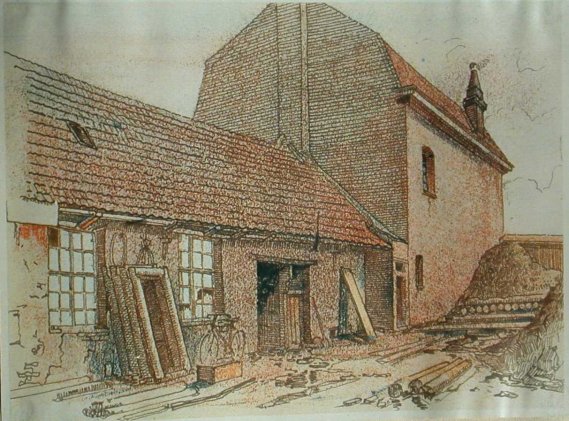
Fromelles Watercolor, 1915, by Hitler
1915 World War I: List Regiment: Gefreiter Adolf Hitler's 16 Reserve Infantry Regiment continue to occupy a position at Fromelles, on a level field with water channels, willow trees and willow stalks. In the distance towards the enemy lines lies an insignificant wood with barbed wire entanglements. Under the direction of their defense-minded commander, Lieutenant General Gustav Scanzoni von Lichtenfels, the regiment works ceaselessly day and night to further fortify their position at Fromelles while fighting off repeated assaults by the enemy. [For further details, Click here.]
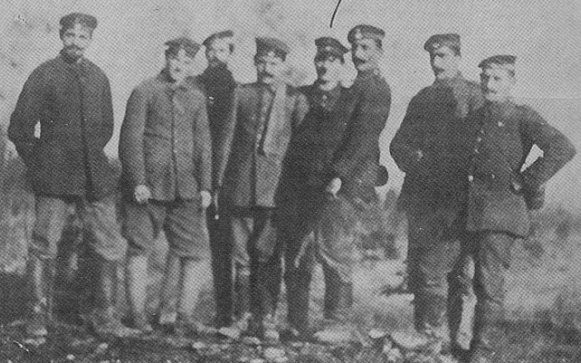
Hitler and his fellow dispatch runners
1916 World War I: List Regiment: Hitler's regimental command loses the use of their field telephones during an intense enemy barrage in the Fromelles sector. Hitler and another runner are sent to deliver a dispatch to the front lines, but are soon pinned down in watery shell holes. When his fellow runner collapses from exhaustion, Hitler drags him back to their dugout. [For further details, Click here.]
[See: Was Adolf Hitler a 'War Hero' in World War I?]1917 World War I: Various:
Military Aviation: The US House of Representatives appropriates $640 million for a military aviation program. The army begins the war with 55 planes and 4,500 aviators. By the end of the war more than 16,000 US aircraft will be in service.
List Regiment: Gefreiter Adolf Hitler's 16th RIR remain deployed for Phase 1 operations in Flanders, Belgium. [For further details, Click here.]
1918 World War I: Various:
Second Battle of the Marne launched by Germany: The Allies, warned of the attack by deserters, aerial reconnaissance, and prisoners, batters the advancing Germans with artillery. East of Reims the attack is halted within a few hours by the French. West of Reims 14 divisions of the German Seventh Army cross the Marne, but American forces rebuff the attack.
War at Sea: The French troop carrying liner Djemnah is sunk by a German submarine in the Mediterranean; 442 people are killed.
Quentin Roosevelt killed: On this day in 1918, Quentin Roosevelt, a pilot in the United States Air Service and the fourth son of former U.S. President Theodore Roosevelt, is shot down and killed by a German Fokker plane over the Marne River in France.
1919 Weimar: With the signing of the peace treaty, the embargo of trade with Germany is lifted and the US resumes business relations. (THP)
1933 Nazi Germany: Various:
Church and Reich: The German Cabinet approves the Concordat with the Vatican. During the deliberations, Hitler stresses the significance of the Concordat, especially "in the urgent fight against the international Jews. Possible shortcomings in the Concordat can be rectified later when the foreign policy situation is better." (THP)
Eugenics: In the same cabinet session that approves the Concordat, the new government approves the "Law for the Prevention of Genetically Diseased Offspring."
On July 14, 1933, the Nazi dictatorship fulfilled the long-held dreams of eugenics proponents by enacting the Law, based on a voluntary sterilization law drafted by Prussian health officials in 1932. The new Nazi law was co-authored by Falk Ruttke, a lawyer, Arthur Guett, a physician and director of public health affairs, and Ernst Ruedin, a psychiatrist and early leader of the German racial hygiene movement. Individuals who were subject to the law were those men and women who 'suffered' from any of nine conditions assumed to be hereditary: feeblemindedness, schizophrenia, manic-depressive disorder, genetic epilepsy, Huntington's chorea (a fatal form of dementia), genetic blindness, genetic deafness, severe physical deformity, and chronic alcoholism. Special hereditary health courts lent an aura of due process to the sterilization measure, but the decision to sterilize was generally routine.
Holocaust: The Nazis also pass the Law on the Revocation of Naturalization and Deprivation of German Citizenship of Jews. German citizenship can now be taken away from those designated as "undesirables."
One-party State: Laws against the creation of any new political parties and on Plebiscites are passed. All political opposition to Nazism is outlawed and the Nazi party becomes the sole political party in Germany. By June 1933, the Social Democrats, the Communists, the German Nationalists (DNVP), the German People's Party (DVP), and the German Democratic Party (DDP) had all been forced to disband. The Catholic Centre Party disbanded themselves on the 5th July 1933 having received guarantees concerning catholic education and youth groups. On the 14th July 1933 Germany officially became a one party state, with the passing of the Law against the formation of parties.
[See: How Did Hitler Consolidate his Power?]Danzig:Hermann Rauschning Nazi President of the Danzig Senate, is snubbed by Jewish members of the Warsaw city government when they refuse to participate in an official reception held in his honor.
1938 Holocaust: The third regulation of the Reich Citizenship Law is published. All Jewish-owned businesses are again advised they must register with the government.
1940 World War II: Various:
Churchill delivers a radio speech:
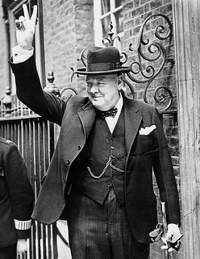
[We] shall not waste our breath nor cumber our thought with reproaches. When you have a friend and comrade at whose side you have faced tremendous struggles, and your friend is smitten down by a stunning blow, it may be necessary to make sure that the weapon that has fallen from his hands shall not be added to the resources of your common enemy. But you need not bear malice because of your friend's cries of delirium and gestures of agony. You must not add to his pain; you must work for his recovery. The association of interest between Britain and France remains. The cause remains. Duty inescapable remains. So long as our pathway to victory is not impeded, we are ready to discharge such offices of good will toward the French Government as may be possible, and to foster the trade and help the administration of those parts of the great French Empire which are now cut off from captive France, but which maintain their freedom
Note: During June and early July, the German Air Force was regrouped to open the vital first stage of "Operation Sea Lion" (the invasion of Britain) by destroying the Royal Air Force. The Battle of Britain began on July 10.
[See: Why Did Hitler Lose The Battle of Britain?]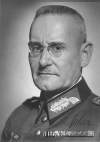
From the diary of General Franz Halder: "The Fuehrer confirms my impressions of yesterday. He would like an understanding with Great Britain. He knows that war with the British will be hard and bloody, and knows also that people everywhere today are averse to bloodshed."
1940 Auschwitz: Facilities using forced (slave) labor in the production of synthetic rubber and gasoline begin operation:
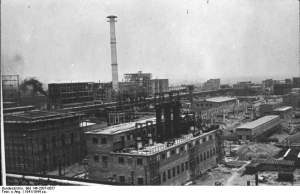
Though Auschwitz was just one of six extermination camps, it was also a labor concentration camp, extracting prisoners' "value" from them, in the form of hard labor, for weeks or months. As the prisoners weakened from disease, or the starvation rations, or overwork, they were selected to be taken to the gas chambers for a more "humane" death. In this, Auschwitz differed from most of the other camps, like Belzec or Treblinka.
1941 World War II: Various:
Egypt: The Suez Canal is bombed by German Ju-88 bombers from Crete. Harbor installations and several ships are damaged.
[See: The Mediterranean Strategy.]Foreign Legion: French Foreign Legionaries sign an armistice in Damascus, allowing them to join the Free French Foreign Legion.
The Foreign Legion played a smaller role in World War II, though having a part in the Norwegian, Syrian, and North African campaigns. The 13th Demi-Brigade was deployed in the Battle of Bir Hakeim. Reflecting the divided loyalties of the time, part of the Legion joined the Free French movement while another part served the Vichy government. A battle in the Syria-Lebanon campaign of June 1941 saw legionnaire fighting legionnaire as the 13th Demi-Brigade (D.B.L.E.) clashed with the 6th Regiment Etranger d'Infanterie at Damas in Syria. Later, 1,000 of the rank and file of the Vichy Legion unit joined the 13th D.B.L.E. of the Free French forces as a third battalion. Following the war, many former German soldiers joined the Legion to pursue a military career with an elite unit, an option that was no longer possible in Germany. Germans still constitute a strong presence in the Legion.
Optimism: Believing the campaign in the East soon to be concluded in Germany's favor, Hitler orders the German war industry to shift production away from guns and armored vehicles to U-boats and airplanes.
[See: What Were Adolf Hitler's Major Blunders?]Churchill delivers a wartime speech:
We have to ask ourselves this question: Will the bombing attacks come back again? We have proceeded on the assumption that they will. Many new arrangements are being contrived as a result of the hard experience through which we have passed and the many mistakes which no doubt we have made - for success is the result of making many mistakes and learning from experience. If the lull is to end, if the storm is to renew itself, we will be ready, we will not flinch, we can take it again.
1942 World War II: Various:
Russian Front: The advances by Heeresgruppe A (List) and Heeresgruppe B (von Weichs) toward the Don bend at Kalach and Rostov continue against minimal Soviet resistance.
1942 World War II: North Africa: Once all the data concerning the North African Campaign is analyzed it can be clearly seen that it was the field of supplies that was the critical factor for both the Allies and the Axis powers. It was the Allied success in the Mediterranean that enabled them to land an enormous amphibious force in the Torch landings and equip the Eighth Army to defeat the Afrika Korps at El Alamein in September 1942. Supplies were the single most important factor that influenced the outcome of the North African Campaign, because they were critical to a theatre that was a considerable distance from both of the main participating nations (Germany and Britain)and had to be delivered to North Africa via the Mediterranean under the constant threat from submarine, surface, and Air forces. Both the Afrika Korps and the Eighth Army both totally and constantly relied upon supplies for essential fuel and equipment ranging from tanks and guns all the way down to food and uniforms.
Holocaust: Thousands of Jews are rounded up and arrested in Amsterdam:
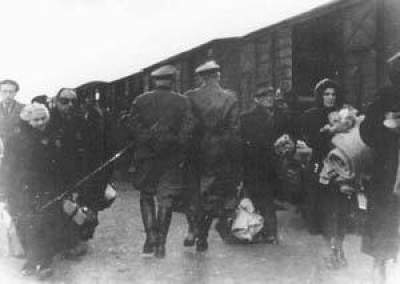
These refugees would be no better off in the Netherlands. Soon after the Nazi occupation, the first anti-Jewish laws removed Jews from their professions, their schools, and their homes. In late 1941, a deportation plan was enacted providing for the removal of the Jews from all the provinces and their concentration in Amsterdam. This phase was launched on January 14, 1942, beginning with the town of Zaandam. The Dutch nationals among the Jews were ordered to move to Amsterdam, while those who were stateless were sent to the Westerbork camp.
The attempt to make Holland Judenrein (clean of Jews) was completed when the Nazis began to deport Jews countrywide on October 2, 1942. 12,296 were deported. In May 1943, the rate of deportations was accelerated. Most were sent to Auschwitz and Sobibor. Interestingly, a relatively large percentage of the Holocaust survivors in Amsterdam did so by either hiding with non-Jews, or forging documents with the help of non-Jews.
1943 World War II: Russian Front: Joining in the counter-offensive by the Central, Bryansk and Western Fronts, the Soviet Western Front (Vatutin) launches attacks against 4 Panzerarmee and Armee-Abteilung Kempf in the southern sector of the Kursk salient.
1944 World War II: Various:
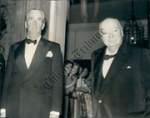
Churchill to Foreign Secretary Eden:
This requires careful handling. It is quite possible that rich Jews will pay large sums of money to escape being murdered by the Huns. It is tiresome that this money should get into the hands of ELAS (Greek Communist partisans), but why on Earth we should go and argue with the United States about it I cannot conceive. We should take a great responsibility if we prevented the escape of Jews, even if they should be rich Jews. I know it is the modern view that all rich people should be put to death wherever found, but it is a pity that we should take up that attitude at the present time. After all, they have no doubt paid for their liberation so high that in the future they will only be poor Jews, and therefore have the ordinary rights of human beings.
Russian Front: The Soviet 1st Ukrainian Front (Konev) begins an offensive east of Lvov and recaptures Pinsk. Note: Pinsk fell to the Russian Empire in 1793 in the Third Partition of Poland, became part of Poland in 1920 after the Polish-Soviet War, and was incorporated into Soviet Union in 1939. At this time, the city's population was over 90% Jewish. From 1941 to 1944 it was occupied by Nazi Germany, and its Jewish population interned in concentration camps. As of 1991 Pinsk has belonged to the Republic of Belarus.
1945 World War II: Various:

SHAEF: General Eisenhower announces closure of Supreme Headquarters Allied Expeditionary Force (SHAEF) and eases restrictions on fraternization between American soldiers and German civilians.
War against Japan: 50,000 tons of Japanese shipping is sunk in the Tsugaru Straits as American battleships and cruisers bombard the Japanese home islands for the first time.

1969 Less than a week before the launch of Apollo 11, a press conference is held at Cape Kennedy: From an account by author Norman Mailer:
Since he [Werner von Braun, Hitler's former chief rocket scientist, who is now working for the US] had . . . a big burly squared-off bulk of a body which gave hint of a methodical ruthlessness of more than one Russian bureaucrat, von Braun's relatively small voice, darting eyes, and semaphoric presentation of lip made it obvious he was a man of opposites. He revealed a confusing aura of strength and vulnerability, of calm and agitation, of cruelty and concern, phlegm and sensitivity, which would have given fine play to the talents of so virtuoso an actor as Rod Steiger. Von Braun had in fact something of Steiger's soft voice, the play of force and weakness which speaks of consecration and vanity, dedication and indulgence, steel and fat.
[See: Wunderwaffen: Hitler's Deception and the History of Rocketry.]1974 Death:Carl Spaatz: U.S. Army General Carl Spaatz, fighter pilot and the first chief of staff of an independent U.S. Air Force, dies in Washington, D.C., at age 83.
Edited by Levi Bookin (Copy editor)
levi.bookin@gmail.com



Click to join 3rdReichStudies



Disclaimer: This site includes diverse and controversial materials—such as excerpts from the writings of racists and anti-Semites—so that its readers can learn the nature and extent of hate and anti-Semitic discourse. It is our sincere belief that only the informed citizen can prevail over the ignorance of Racialist "thought." Far from approving these writings, this site condemns racism in all of its forms and manifestations.
Fair Use Notice: This site may contain copyrighted material the use of which has not always been specifically authorized by the copyright owner. We are making such material available in our efforts to advance understanding of historical, political, human rights, economic, democracy, scientific, environmental, and social justice issues, etc. We believe this constitutes a "fair use" of any such copyrighted material as provided for in section 107 of the US Copyright Law. In accordance with Title 17 U.S.C. Section 107, the material on this site is distributed without profit to those who have expressed a prior interest in receiving the included information for research and educational purposes. If you wish to use copyrighted material from this site for purposes of your own that go beyond 'fair use', you must obtain permission from the copyright owner.
Please Note: The list-owner and moderators of 3rdReichStudies are not responsible for, and do not necessarily approve of, the random ads placed on our pages by our web server. They are, unfortunately, the price one pays for a 'free' website.